28 August 2014 (Hodi's Half Note, Ft. Collins CO)
In recent years, the "Phish pre-show party" has become a thing. In the days before Phish is due to play, bars in nearby towns throw some jam bands onstage and try to capitalize on the fans' excitement. Without naming names, I've been to a few of these and generally found them to be disappointing because the bands aren't a good fit or they just don't have the chops. This show at Hodi's served up a strong counterargument to my lack of enthusiasm. Both Punch Drunk Munky Funk and their opener, Miscomunicado, put on strong shows and made it a great summer evening of music, regardless of the space-time proximity of Phish's tour schedule.
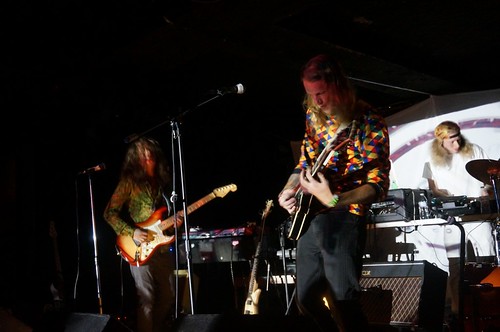
As much as I enjoy catching bands I love, one of the best thing about writing these reviews is that I am exposed to music I might never have otherwise come across. Opening acts can make or break the total show experience, so some people play it safe and show up fashionably late, just in time for the headliner. Anybody running that strategy for this show missed a very interesting band. Miscomunicado juxtaposed a few standard ideas into a strange, but cool band configuration. Drawing from electronic acts and hip hop, they relied on laptop driven tracks for the foundation beats and bass. But instead of MCs or turntablists filling out the group, they had a two-pronged guitar attack that expanded the sound into deep-space funk. Rounding out the performance, their live projection artist, skEYEfi, provided a psychedelic visual accompaniment.
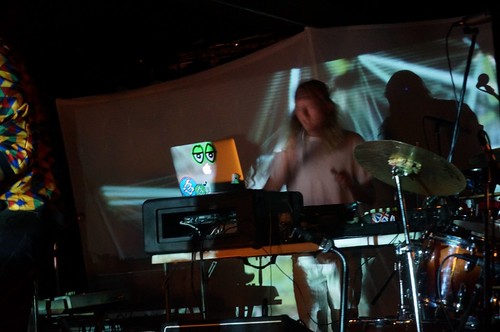
Luke Barone jump started the show with a solid funk groove. Dan Scott Forreal and James Hodgkins quickly joined in with their guitars, pushing the tune into trippier dimensions. The music had a strong improvisational looseness, but the backing rhythm maintained the structure. From song to song, Barone controlled the main mood via his pre-recorded chunklets. The guitars added riff-driven, heady accents for the jam. Barone had the flexibility to extend and mutate the backing, so they could milk the pieces for maximum effect. While several of the songs were instrumentals, Forreal and Hodgkins sang some of the time. For the most part, these were funk style sloganeering -- repetitive vocal accents that could provide a bit of context for the song -- but they also had some lyrics that rose above that simple role.
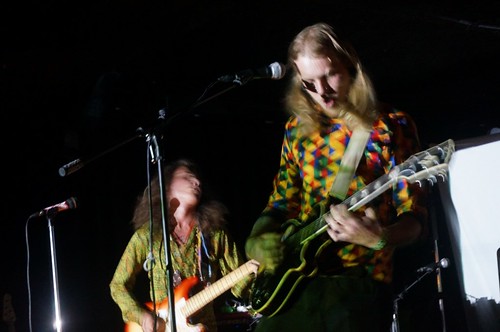
While Miscomunicado's music was anchored in improvisational funk, it was usually cross-pollinated with dance pop, electronica, uptempo rock, or psychedelic fringes. This meant that each song had its own character. The projection work adapted to the mood, taking advantage of found footage and movie clips or abstract kaleidoscopic patterns and animations. Given that the art was the primary source of stage lighting, that made it a supreme challenge to get good pictures, but the live experience is pretty fun.
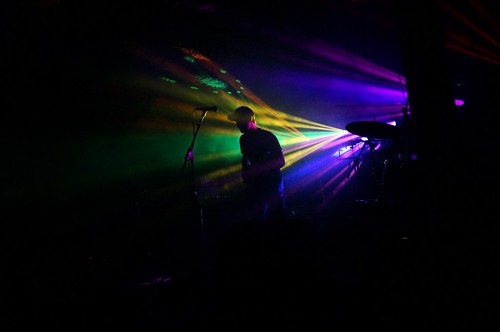
My introduction to Punch Drunk Munky Funk was the "Funk Your Face Off" show earlier this summer at The Mishiwaka. Their set impressed me then because they were undeniably capable of launching out into creative musical sojourns, but their impressively focused rhythm section anchored the songs. That tight-loose dichotomy lies at the heart of the best jam bands and this made PDMF a good fit for the whole Phish pre-show theme. But from the beginning of this show, the band wasn't going to leave any doubt. An amorphous lead-in created a trippy mood that opened the door for Chris Robbiano's bass heavy funk groove, and it quickly became clear that this was their version of Phish's "Down With Disease".
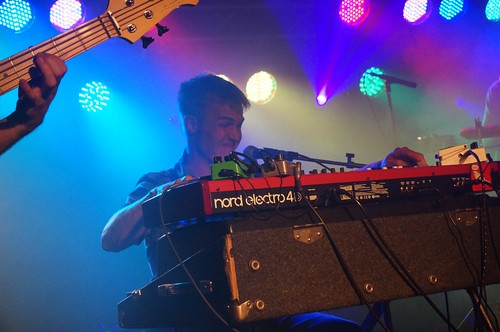
Keyboard player Mike Givens handled the vocal duties, doing a passable job of sounding like Trey Anastasio, while Alex Boivin showed that he had the guitar part well in hand. Switching adeptly between sharp funk chordlets and more flowing jazz melodies, he held court at center stage. While Phish can easily make the tune last a good 20 to 30 minutes, PDMF didn't drag it out as long, but it was a solid jam that pumped up the crowd.

The band went on to play some of their own music, including one of my favorite tunes, "Double Richard". "Double Richard, you found your twin/ A dose of Siamese peace within," the oblique lyrics became a mantra, backed by a cheerful march beat before the band sprang off into well-paced melodic exploration. They'd go on to round out the set with servings of disco funk, jazz (both spacey and cool), and even a bit of folky jam. This stylistic meandering let the band demonstrate their versatility between getting down and dirty on the beat and leaving more breathing room in the mix.
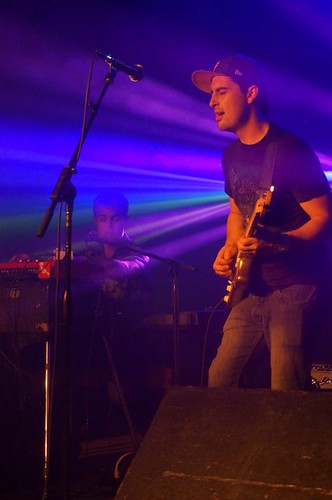
After a brief intermission, they came out for the second set, where they pretty much became a Phish tribute band. "Down With Disease" had gone so well, but let's face it, Phish is not an easy band to imitate in longer form. Most aspirants don't have the technical skills to sustain a full set, and those that do, often get there by slavishly recreating the originals. Either way, tribute bands usually leave me pining for the real thing rather than satisfied. Punch Drunk Munky Funk's second set broke that pattern about the time they slipped into their cover of "Stash". Boivin casually tossed off the trademark opening guitar riff and the rest of the band joined in, staying fairly true to the original: the tight percussion fills and electric piano vamps perfectly hit their marks as they supported the guitar line. The crowd loved it, providing the staccato claps on cue to help out the percussion. The band went on to make the tune their own, with the band members showing off their abilities without merely imitating Trey and company.
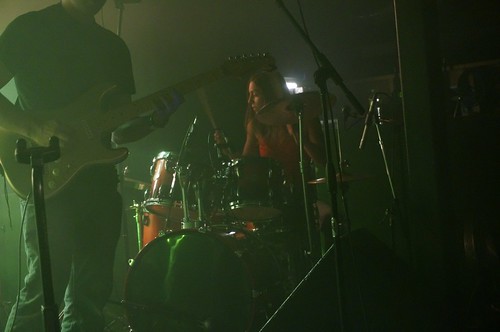
Michelle Pietrafitta's drumming, which blew me away at The Mish, was equally amazing here. She could find space to nestle some impressive open fills within her tight snare and high hat work. This relaxed the beat just enough to create both tension and a sense of inevitability as the beat, never lost, reasserted itself. Similarly, while the mix didn't always accentuate his contribution, Robbiano's bass playing helped drive the dynamics of the songs, drifting between flashy punch and bubbling melodic lines.
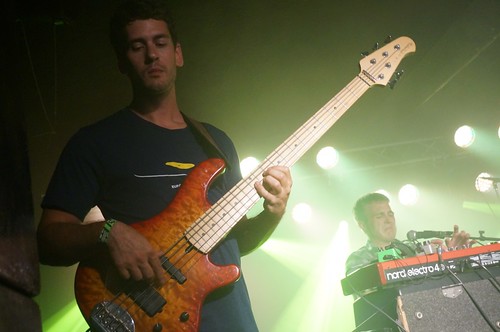
The set was packed with classic Phish tunes, with "Punch You In The Eye" and "Mike's Song" being standout moments. By the time it was done, I was flying with their versions of the songs, feeling little need to listen to the real band on the ride home. The encore performance of "Also Sprach Zarathustra" (AKA "2001") was just icing on the cake. This was a different side of the band compared to their Funk Your Face Off performance, but I'm eager now to hear what else they can do.
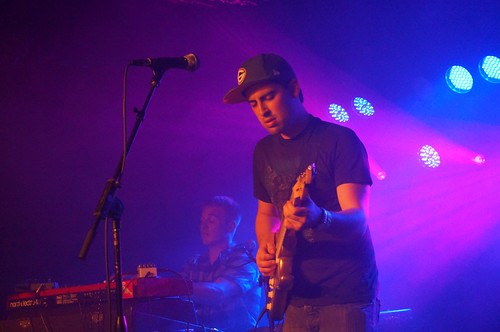
More photos on my Flickr.
In recent years, the "Phish pre-show party" has become a thing. In the days before Phish is due to play, bars in nearby towns throw some jam bands onstage and try to capitalize on the fans' excitement. Without naming names, I've been to a few of these and generally found them to be disappointing because the bands aren't a good fit or they just don't have the chops. This show at Hodi's served up a strong counterargument to my lack of enthusiasm. Both Punch Drunk Munky Funk and their opener, Miscomunicado, put on strong shows and made it a great summer evening of music, regardless of the space-time proximity of Phish's tour schedule.

As much as I enjoy catching bands I love, one of the best thing about writing these reviews is that I am exposed to music I might never have otherwise come across. Opening acts can make or break the total show experience, so some people play it safe and show up fashionably late, just in time for the headliner. Anybody running that strategy for this show missed a very interesting band. Miscomunicado juxtaposed a few standard ideas into a strange, but cool band configuration. Drawing from electronic acts and hip hop, they relied on laptop driven tracks for the foundation beats and bass. But instead of MCs or turntablists filling out the group, they had a two-pronged guitar attack that expanded the sound into deep-space funk. Rounding out the performance, their live projection artist, skEYEfi, provided a psychedelic visual accompaniment.

Luke Barone jump started the show with a solid funk groove. Dan Scott Forreal and James Hodgkins quickly joined in with their guitars, pushing the tune into trippier dimensions. The music had a strong improvisational looseness, but the backing rhythm maintained the structure. From song to song, Barone controlled the main mood via his pre-recorded chunklets. The guitars added riff-driven, heady accents for the jam. Barone had the flexibility to extend and mutate the backing, so they could milk the pieces for maximum effect. While several of the songs were instrumentals, Forreal and Hodgkins sang some of the time. For the most part, these were funk style sloganeering -- repetitive vocal accents that could provide a bit of context for the song -- but they also had some lyrics that rose above that simple role.

While Miscomunicado's music was anchored in improvisational funk, it was usually cross-pollinated with dance pop, electronica, uptempo rock, or psychedelic fringes. This meant that each song had its own character. The projection work adapted to the mood, taking advantage of found footage and movie clips or abstract kaleidoscopic patterns and animations. Given that the art was the primary source of stage lighting, that made it a supreme challenge to get good pictures, but the live experience is pretty fun.

My introduction to Punch Drunk Munky Funk was the "Funk Your Face Off" show earlier this summer at The Mishiwaka. Their set impressed me then because they were undeniably capable of launching out into creative musical sojourns, but their impressively focused rhythm section anchored the songs. That tight-loose dichotomy lies at the heart of the best jam bands and this made PDMF a good fit for the whole Phish pre-show theme. But from the beginning of this show, the band wasn't going to leave any doubt. An amorphous lead-in created a trippy mood that opened the door for Chris Robbiano's bass heavy funk groove, and it quickly became clear that this was their version of Phish's "Down With Disease".

Keyboard player Mike Givens handled the vocal duties, doing a passable job of sounding like Trey Anastasio, while Alex Boivin showed that he had the guitar part well in hand. Switching adeptly between sharp funk chordlets and more flowing jazz melodies, he held court at center stage. While Phish can easily make the tune last a good 20 to 30 minutes, PDMF didn't drag it out as long, but it was a solid jam that pumped up the crowd.

The band went on to play some of their own music, including one of my favorite tunes, "Double Richard". "Double Richard, you found your twin/ A dose of Siamese peace within," the oblique lyrics became a mantra, backed by a cheerful march beat before the band sprang off into well-paced melodic exploration. They'd go on to round out the set with servings of disco funk, jazz (both spacey and cool), and even a bit of folky jam. This stylistic meandering let the band demonstrate their versatility between getting down and dirty on the beat and leaving more breathing room in the mix.

After a brief intermission, they came out for the second set, where they pretty much became a Phish tribute band. "Down With Disease" had gone so well, but let's face it, Phish is not an easy band to imitate in longer form. Most aspirants don't have the technical skills to sustain a full set, and those that do, often get there by slavishly recreating the originals. Either way, tribute bands usually leave me pining for the real thing rather than satisfied. Punch Drunk Munky Funk's second set broke that pattern about the time they slipped into their cover of "Stash". Boivin casually tossed off the trademark opening guitar riff and the rest of the band joined in, staying fairly true to the original: the tight percussion fills and electric piano vamps perfectly hit their marks as they supported the guitar line. The crowd loved it, providing the staccato claps on cue to help out the percussion. The band went on to make the tune their own, with the band members showing off their abilities without merely imitating Trey and company.

Michelle Pietrafitta's drumming, which blew me away at The Mish, was equally amazing here. She could find space to nestle some impressive open fills within her tight snare and high hat work. This relaxed the beat just enough to create both tension and a sense of inevitability as the beat, never lost, reasserted itself. Similarly, while the mix didn't always accentuate his contribution, Robbiano's bass playing helped drive the dynamics of the songs, drifting between flashy punch and bubbling melodic lines.

The set was packed with classic Phish tunes, with "Punch You In The Eye" and "Mike's Song" being standout moments. By the time it was done, I was flying with their versions of the songs, feeling little need to listen to the real band on the ride home. The encore performance of "Also Sprach Zarathustra" (AKA "2001") was just icing on the cake. This was a different side of the band compared to their Funk Your Face Off performance, but I'm eager now to hear what else they can do.

More photos on my Flickr.

 Is anyone else getting tired of the glut of twee retro bands? Sure, jangle and reverb are cool, but there’s got to be a limit.
Is anyone else getting tired of the glut of twee retro bands? Sure, jangle and reverb are cool, but there’s got to be a limit.  Let me tell you a story about a girl who missed her first shot at pop stardom. Although her debut release was poorly received, she eventually found some success as a singer, but it looked like writing for others, such as Rihanna, Flo Rida and Beyoncé, was as close as she’d get to her dream of achieving big-time pop glory. Health problems and panic attacks threatened to sideline her into performance retirement, but she finally tapped into her well of struggle and pain, partnered with a talented producer friend and made her bid for the spotlight.
Let me tell you a story about a girl who missed her first shot at pop stardom. Although her debut release was poorly received, she eventually found some success as a singer, but it looked like writing for others, such as Rihanna, Flo Rida and Beyoncé, was as close as she’d get to her dream of achieving big-time pop glory. Health problems and panic attacks threatened to sideline her into performance retirement, but she finally tapped into her well of struggle and pain, partnered with a talented producer friend and made her bid for the spotlight.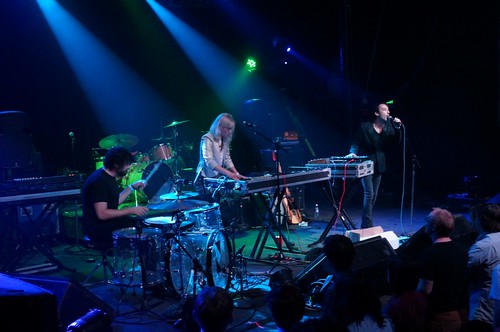

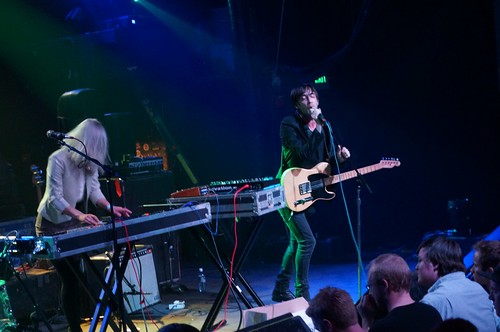
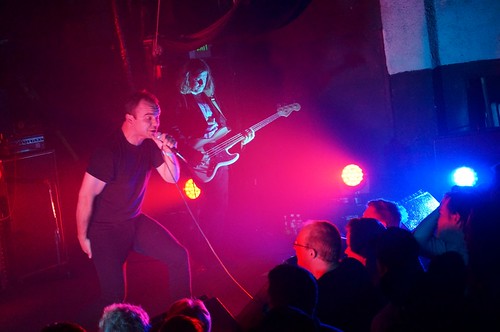
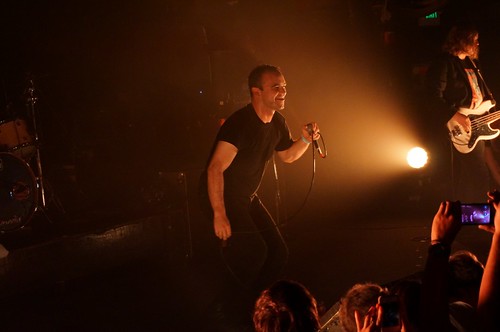
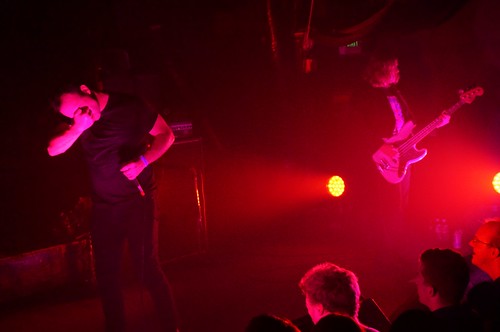
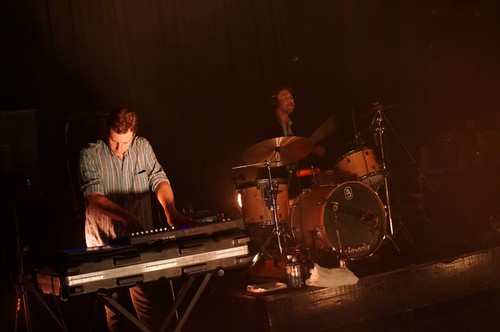
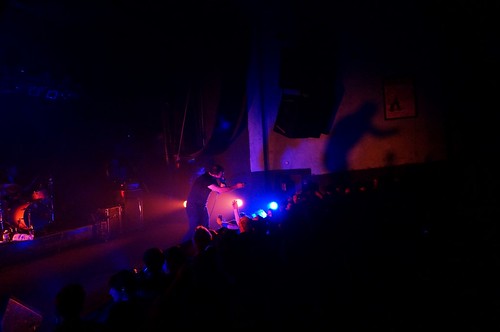
 My first taste from
My first taste from  Have you heard the story of the boy who sang “wolf?”
Have you heard the story of the boy who sang “wolf?”  Go ahead, judge
Go ahead, judge